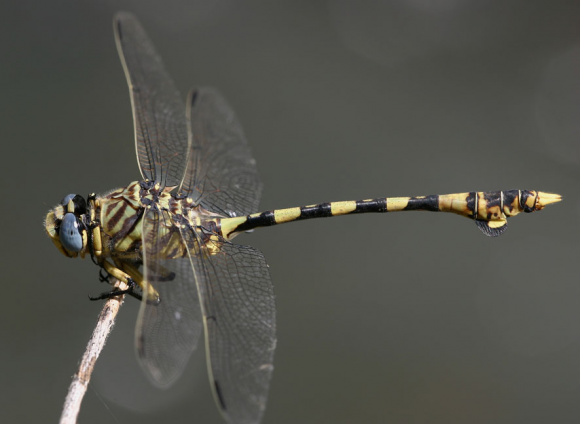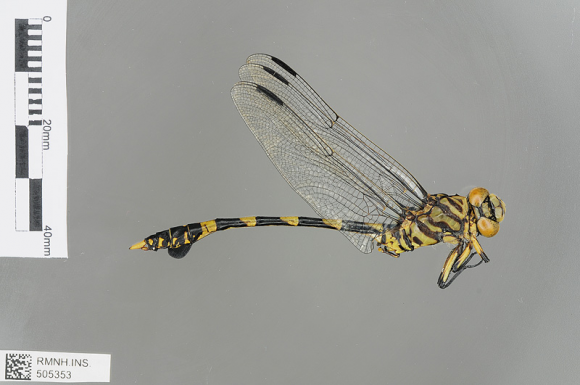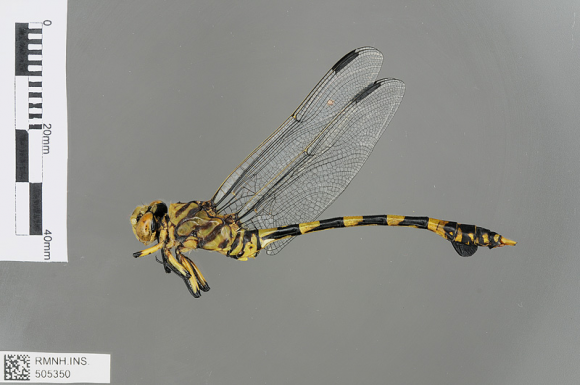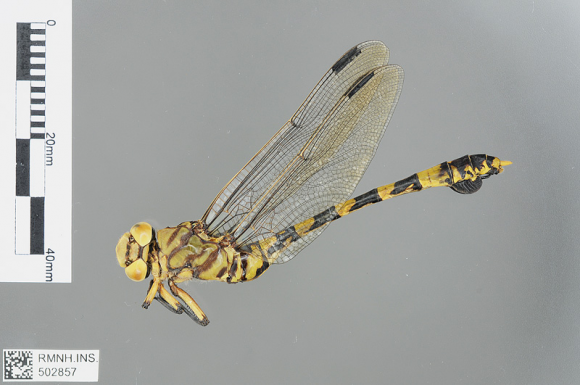Ictinogomphus ferox (Rambur, 1842)
Common Tigertail
Type locality: Senegal, no locality data available.
Diagnosis
Male is similar to I. regisalberti by (a) posterior hamule hollowed out internally, with dense hair tuft in hollow, and at least base or apex black; (b) apical halves S4-6 black, at most with pale dorsal streak; (c) foliations on S8 over 1/3 as deep as segment is high. However, differs by (1) occcurring at open habitats almost throughout Africa; (2) smaller size, Hw 39-44 mm; (3) labrum pale with small central black spot, clypeus with 2 isolated black spots, apices of vertex pale; (4) posterior hamule partly pale rather than largely black, although at least with apex black; (5) cerci with blunt rather than sharp ventral angle. [Adapted from Dijkstra & Clausnitzer 2014]
Habitat description
Standing waters, large lakes, rivers, and probably also flowing channels in marshes, in open landscapes. Often with a sandy and/or soft (like muddy) bottom. From 0 to 2000 m above sea level, but mostly below 1500.
Distribution

Male © Hans-Joachim Clausnitzer
 Appendages (dorsal view) |
 Appendages (lateral view) |
 Abdomen (lateral view) |
 Abdominal segment 2 (ventral view) |
Map citation: Clausnitzer, V., K.-D.B. Dijkstra, R. Koch, J.-P. Boudot, W.R.T. Darwall, J. Kipping, B. Samraoui, M.J. Samways, J.P. Simaika & F. Suhling, 2012. Focus on African Freshwaters: hotspots of dragonfly diversity and conservation concern. Frontiers in Ecology and the Environment 10: 129-134.
Barcode specimen(s):

Male; Democratic Republic of Congo, Katanga, © Dijkstra, K.-D.B.

Male; Democratic Republic of Congo, Katanga, © Dijkstra, K.-D.B.

Female; Tanzania, Kigoma Region, Kibirizi © Dijkstra, K.-D.B.
References
- Rambur, P. (1842). Histoire Naturelle des Insectes. Neuroptères. Insectes Neuroptères. Paris: Librairie Encyclopédique de Roret xvii, pp534.
- Balinsky, B. I. (1961) Observations on the dragonfly fauna of the coastal region of Zululand, with descriptions of three new species (Odonata). Journal Entomological Society Southern Africa 24 (1): 72-91 [PDF file]
- Pinhey, E.C.G. (1961). Dragonflies (Odonata) of Central Africa. Occasional Papers Rhodes-Livingstone Museum, 14, 1-97. [PDF file]
- Pinhey, E.C.G. (1966). Check-list of dragonflies (Odonata) from Malawi, with description of a new Teinobasis Kirby. Arnoldia, 2, 1-24. [PDF file]
- Ris, F. (1931). Odonata aus Süd-Angola. Revue Suisse Zoologie, 38, 97-112. [PDF file]
- Pinhey, E.C.G. (1962). Some records of Odonata collected in tropical Africa. Journal Entomological Society Southern Africa, 25, 20-50. [PDF file]
- Fraser, F.C. (1949). Gomphidae from the Belgian Congo (order Odonata). Revue Zoologie Botanique Africaines, 42, 101-138. [PDF file]
- Schouteden, H. (1934). Annales Musee Congo belge Zoologie 3 Section 2, 3, 1-84. [PDF file]
- Pinhey, E.C.G. (1971). Odonata collected in Republique Centre-Africaine by R. Pujol. Arnoldia, 5, 1-16. [PDF file]
Citation: Dijkstra, K.-D.B (editor). African Dragonflies and Damselflies Online. http://addo.adu.org.za/ [2024-10-30].

